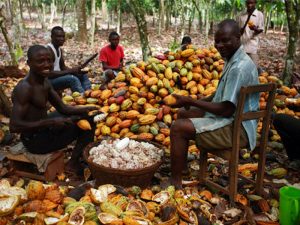Blog Post 2: Contemplative Practice
Contemplative practices have been integral part of the learning experience for Political Ecology of the World Food System. Making students engage in these practices has proven to be a unique teaching style, and in a course that is so ecologically integrative, these techniques have allowed the cohort to both understand the system better, and to attempt to place themselves within it.

Particularly, the contemplative practice using chocolate and cocoa seemed to have a profound impact on the students, and myself. We were asked to first eat and savour the cocoa (chocolate in its rawest form), making note of the complexities of taste and texture, its bitterness and crunchiness. Then, we tasted the chocolate, focusing particularly on its sweetness in contrast to the cocoa.
The practice gave better understanding to a topic explored broadly throughout the course: how some individuals benefit from the global food system, and how some are disenfranchised by it. For me, really experiencing the transition from cocoa to chocolate gave me a clearer perspective of the process that food production undergoes, and the ramifications that it may have.
Specifically, this practice drew my attention to how some people benefit from the labour of others’ within the world food system. Relating this to the week 7 reading, Nation Built on Slavery (Yes! Magazine), the cocoa reminded me of how Western industrialised societies so often benefit of the back of poor labourers, just how exploited workers launched the modern capitalist American society (p. 26), and how food industries today continue to disenfranchise minority groups economically and culturally (Raj Patel, p. 3).


It also brought my attention more towards the food chain, specifically ‘free trade’, and made me question whether trade in a global economic-political context could ever be ‘free’ (Carolan, p. 53).


Your post touches on a lot of important points about the cocoa and chocolate contemplative practice, which I also found very useful in highlighting the inequality inherent in industries like the chocolate one. Your concern about “free trade” actually made me think of the lecture we had on “discursive politics” from last Thursday (5/10); it is called “free trade,” but that is merely a framework in which to look at the trade agreements within these industries. Is it actually free? The system of trade as a whole, being built on a colonial, capitalist structure in which historically colonized countries, characterized by their wealth of resources, were exploited. This system continues to run, under the misleading and myopic term “free trade,” in which a resource like cacoa is made profitable by the labor of people normally can’t even afford to try what it gets turned in to.
Response 1:
I really enjoyed how you engaged in the contemplative practice, and described your experience. Your writing touches on a lot of important points that were discussed throughout the readings and in lecture. As you talked about the inequity that is rooted within the operation of the current world food system it made me think about how exploitive many factions of the food system are. So much of our food system disenfranchises hardworking individuals and families to benefit the few who possess the privilege to assess wide varieties of foods that comes from around the globe. I always think about what action can be taken and what solutions could be implemented in order to create positive change, but the issues are highly complex as we have learned throughout the duration of this quarter. There seems to be no simple solution. There are also places in which a “one solutions fits all” approach shouldn’t be taken, because what works in one area does not work in every area. Is moving away from a capitalistic framework part of the answer, or does the issue not arise out of capitalism?
It’s important to understand the deeper meaning of the contemplative practices and really grasp why we do them, and I think this post is able to identify that. Discussing the relation of chocolate to the inner-workings of the world food system really brings to light what many people take for granted, and what others don’t really ever get to see. Something as simple as chocolate goes through a process that many people don’t understand, or don’t care about, and yet they eat chocolate almost every day. Towards the end, you then do a good job of bringing it around and relating it to “free trade.” Those who benefit the most from the world food market may consider it “free trade,” and yet the people who are putting the work in and get close to nothing in return almost certainly don’t feel that way.
I agree with you that the cocoa activity did have a profound impact on the class and myself, in making us think critically about where our food comes from. The cocoa activity did make us think about who benefits from the global food system and who falls victim to it. The cocoa activity made us reflect on a very good example of how developed countries reap the benefits of the world food system, while less developed countries are being exploited. In the case of cocoa , developed nations are able to make millions in profit from raw cocoa by using industrialized processes to turn cocoa into chocolate, less developed nations don’t have access to the same resources that would allow them to mass produce chocolate like developed nations can. Also, developed nations encourage child labor, because in their capitalist quest to make the biggest profit they purchase the cheapest cocoa they can get, which usually means it was harvested by children because children are paid the least for their labor. I agree with your overall assessment about the cocoa activity, I would maybe just have gone a little farther to talk about how this activity related to other specific lessons like the ones on the industrialization of food.
I think that drawing the parallel between the bitterness of cacao and the sweetness of chocolate in relation to the process that it goes through is quite thought provoking. When I read it I could immediately draw the connection between the rawness of the cacao and the conditions that it is produced in, with the farmers barely breaking even most harvests if they do at all, and the sweetness of the final product and the massive (I think it was like 4x) profits that the chocolate production companies make from the work that the small farmers put in for minimal return. This contemplative practice was definitely had the most impact for me as well. It was interesting that you brought in the bit about “free” trade at the end, as I wrote in one of my takeaways about how the export taxes put on cacao coming from Africa are more or less completely controlling what farmers are able to grow there and still be able to turn a profit.